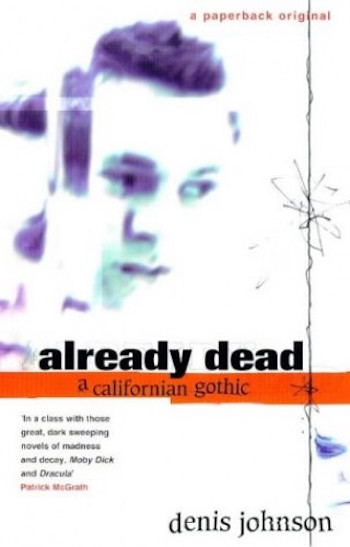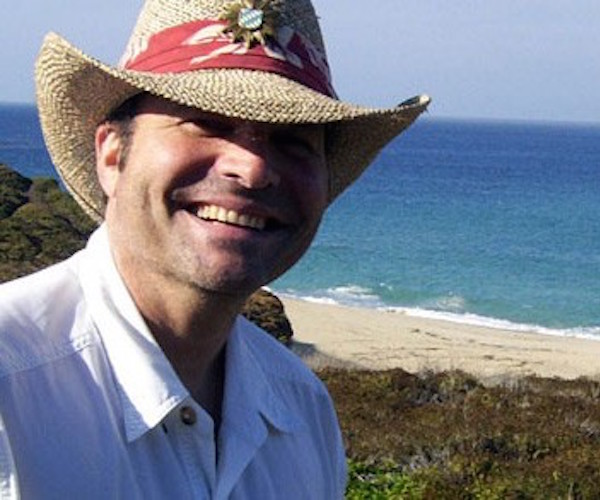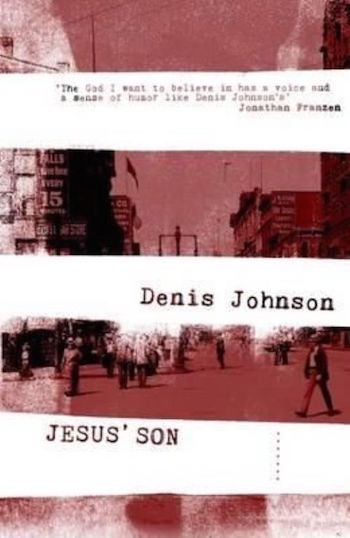Book Review: Denis Johnson’s “California Scheming”
Denis Johnson sees that New Age thinking is a response to something very American, very late-twentieth-century—namely the precariousness of identity.
Editor’s Note: This 1998 review — and Anthony Wallace’s homage to Denis Johnson — are The Arts Fuse‘s responses to the author’s death at the age of 67 on May 25, 2017)
Already Dead: A California Gothic by Denis Johnson. Harper Collins, 448 pages, published 1998.
By Chris Walsh
(Originally published in News from the Republic of Letters, No. 5 (1998)

Denis Johnson’s Already Dead: A California Gothic is Crime and Punishment after Nietzsche and Haight-Ashbury, after the death of God and the Grateful Dead. If America is, as is (or was) universally acknowledged, the land of opportunity, where people come to realize their dreams, the world’s playground, then California, where one makes make-believe happen, is the playground’s playground. “There really is such a place,” writes Johnson. “It is not a mistake of the imagination, it doesn’t disappear like a mirage or back away like a rainbow. Anything, anything, anything!—That’s what California offers.”
Quite a different setting from Dostoevsky’s unforgiving St. Petersburg. Johnson’s Raskolnikovs (there are, democratically enough, more than one) aren’t starving, but twentieth-century American plenty is as unsettling as nineteenth-century Russian poverty. It consigns Johnson’s characters to a ripe juvenility. They’re plagued by the sense that life in the playground isn’t real. They seek to jolt themselves out of this sense through violent transgression. Like children grown too big for their toys, they try to break them.
Unlike children, however, these characters are hyper-self-aware, and at times they speak with a broken and heart-breaking directness to the reader. ‘Tm devising… a horrible plan,” says Nelson Fairchild. “A plan that makes me very sad for all of us.” Because he doesn’t love her and so he can inherit a full share of his father’s property (to pay off a drug debt, lose the henchmen on his trail, and be with the woman he thinks he really loves), Fairchild wants his wife Winona dead. One rainy night, a stranger, Carl Van Ness, tries to drown himself in Fairchild’s pond. Fairchild saves Van Ness, who is resentful, but reborn. Having killed who he was (and read his Nietzsche) Van Ness feels ready for anything including, at Fairchild’s request, murdering Winona. There are many other characters and, though Fairchild’s plans don’t work out, many crimes. Yvonne, a New Age witch, concocts hallucinogens out of toad sweat and feeds them to Navarro, the policeman; a Lutheran minister moonlights in marijuana sales; Fairchild’s drug-dealer partner Clarence Meadows stalks the henchmen who stalk Fairchild.
Sometimes it is hard to tell who is doing what to whom. The reader looking for clarity may get frustrated. The chronology is disjointed and Johnson gives us multiple and very limited third person points of view, shrouding the narrative in the same sort of fog that clings to the California coast. Fragmentation and obscurity are not revolutionary in fiction, to be sure, but they are often employed gratuitously, as cover for vacuity. Johnson uses them advisedly, befogging the reader with the befogged lives of his characters.
Take, for instance, poor Lieutenant Navarro. The most solid piece of evidence he has for the crimes all around him but just out of his sight is a long letter by a delirious, wounded, and vanished Fairchild. “Unsigned, unexplained, unclassified—confession or conjecture? Murder plot or movie plot? Notes of a conspirator or notes of a suicide or ravings of a madman or-.” This letter, the last page of which is written in blood, has a powerful hold on Navarro, but he cannot bring himself to act on its contents. While Dostoevsky’s Inspector Porfiry is a picture of ironic rectitude who knows all along what Raskolnikov did and that Raskolnikov will ultimately surrender to him to suffer and be saved, Navarro is a transplant from Los Angeles, a needy, “starve-hearted” man who lives “above the movies” (in an apartment over a video store) and winds up quitting the police force. So much for punishment.
Anything, anything, anything! It is precisely this Californian superabundance that overwhelms and dizzies Navarro and everyone else in Already Dead. Physical abundance unmoors them from the restraints of necessity, then the array of –isms and –etics and –ologies (to call them beliefs or philosophies may do them too much credit) available sets their compasses spinning. Raskolnikov is himself confused, of course, even delirious at times, but he has fundamentally two alternatives: his proto-Nietzschean superman schtick, or Russo-Christian piety and penitence.
Johnson echoes writers as far back as Tocqueville when he observes of “the philosophizing of America, merely to survey its inconsistencies, its gaps and plunges, was to invite a bad dose of vertigo,” but survey he does and his inventory is very contemporary, very California. In town, each gift shop has “its own philosophy”; in the country, a sports car whips “around a curve and right up against the entrance to the Tibetan Buddhist Monastery.” Meadows aspires to Emersonian “balls-out freedom.” Yvonne “channels” voices of the dead and quotes the New Age bible A Course in Miracles. And then there is Nietzsche. Not the German or scholar’s Nietzsche, however—that Nietzsche was, according to Van Ness, “hollow—[a] kid scaring his elders to fend aside his own true terror, he’d never actually lived it all the way out, never tasted his own wares….” In Carl Van Ness we get an American Nietzsche—Nietzsche applied, a remorseless Raskolnikov. All these options drive some of the characters crazy and those who aren’t crazy are vitally compromised, though they couldn’t tell you how or why. The marijuana minister speaks for them all: ‘Tm vague,” he says.
The bright California vocabulary, which, Fairchild observes, divides the world between “okay” (anything from barely not good to downright evil, from hangnail to homicide) and “neat” (anything from okay to heavenly, from a nice car to eternal bliss) works like high-beam headlights against the moral fog: it gives back nothing but a blinding reflection. In Already Dead morality is evoked only in estrangement. Fairchild mentions his “ordinary, happy” neighbors only because they report him for speeding. In a bar he listens to a man tell a friend of seeing a brand new Corvette driven off a cliff: “some jilted kid. The brake lights… never winked.” The friend asks, “What year Corvette?” These two turn out to be the comically inept hit-men hired to hunt down Fairchild—but it is not comic relief they provide, for the novel as a whole, its Gothic gloom notwithstanding, is comic.

The late Denis Johnson – he consigns his characters to a ripe juvenility. Photo: Cindy Johnson.
California is of course a stock comic subject. One of Don DeLillo’s characters in White Noise speaks of how, in this age of overstimulation and distraction, catastrophes have a special, even a salutary claim on our attention, and catastrophes in California are especially good because of the excellent camera coverage. Also, “we can relax and enjoy these disasters because in our hearts we feel that California deserves whatever it gets. Californians invented the concept of lifestyle. This alone warrants their doom.” This is good satirical fun, putting down both California and the rest of us.
Johnson does a similar turn with his frequent deflation of New Age rhetoric, as when Navarro says of a murder victim who allegedly speaks through Yvonne, “So what? Why should I believe some asshole just because he doesn’t have a body?” An excellent point. Maybe dead men do tell lies. Johnson’s comedy, however, cuts more deeply and cleanly than DeLillo’s—is more profound and more sympathetic. He does not dismiss so-called New Age thought, much of which (I am not the first to observe this) is older than the Old Testament. The 1970s did not invent herbs, astrology, or demons and witches; it just did feature stories on them. Johnson also sees that New Age thinking is a response to something very American, very late-twentieth-century—namely the precariousness of identity. For a variety of reasons (mobility, opportunity, the availability of pills and plastic surgery) people can change selves like coats, and do, especially in California. The characters in Already Dead have a peculiar way of understanding this phenomenon. “Don’t ask me who this woman is,” says Fairchild, “walking around in my wife’s body with a decisive air.” In the world of this novel, witch- and demon-possession may be as good an explanation of radical personality transformation as physiological or psychological ones. And there is a metaphysical bright side to the ancient (and “new”) spiritual story that these other explanations lack, as Fairchild reminds us. “So many demons! And I’m happy to see them, and speechless with gratitude for the others I’ve met along the way. Surely if we have these demons we have the rest of it.”
But Johnson is not naive or uncritical about the New Age. His subject is the dark chaos teeming beneath a movement that seeks light and liberation. He wonders what crime and punishment mean, if anything, within such a context. Around Navarro at the Halloween wedding “were witches and demons beyond the stories and fears of any child, lovers of evil to make even a cop afraid and childlike. He knew this, but he no longer knew what evil was. It rarely got arrested. People liked it. The human heart was only one of its homes. Beyond these few ideas, words couldn’t follow….” New Age culture, which stresses the personal and the positive, is confronted with the impersonal and negative and doesn’t know what to do. Notions of crime and punishment require some rudimentary orthodoxy, and the New Age’s greatest claim to newness (as new as, say, Emerson) is its rejection of orthodoxy in the name of the personal, of some transcendent self-realization. But “transcendent self-realization,” if not an outright contradiction, is not enough to fill the void where orthodoxy used to be. Confronted with evil and left to their own flimsy devices, Navarro and other characters (and many modern day militia-men—the New Rurality) fall into paranoia, in which faith and fear are one.
Not that Johnson advocates theocracy or pines for the old law and order. He does not argue anything, or conclude. Comedy does not foreclose; at its most serious it opens on and painfully tickles depths we’d rather keep covered. The funny bone is both funny and a bone. Is there something to this NewAge-old-as-the-hills stuff or is it just another symptom (and cause) of our disintegration? To the very last, Johnson is not saying. The author’s note at the end of the book tells where to send away for A Course in Miracles. This dismayed one prominent reviewer. In my view, telling the reader where he can find an actual New Age book keeps the question alive, the bone ringing. It’s a brave and funny finishing touch.

The natural poet (see Johnson’s collected poems, The Throne of the Third Heaven of the Nations Millennium General Assembly, for evidence that he is such a one) who writes fiction had better be rapturous—like Melville, for example, or D.H. Lawrence—or, because rapture is precious (for better but usually for worse), he had better be careful. James Dickey is said to have gone over Deliverance again and again to make sure nothing sounded poetic. Until now, Johnson has met this challenge by setting his fiction in apocalypse’s aftermath. Fiskadoro is set after a nuclear war, while the apocalypse of Resuscitation of a Hanged Man and the short stories of Jesus’ Son is more personal. Resuscitation tells the tale of a paranoid, metaphysically preoccupied failed suicide; Jesus’ Son sketches episodes from the lives of drifters and druggies, of has-beens and never-weres and never-will-bes. The apocalyptic premise in these novels works like a kind of stylistic neutron bomb, leaving only the essential infrastructure of Johnson’s prose standing. But apocalypse is supposed to disclose something. For Johnson, revelation has until now jutted out in the twisted lyrical touches he occasionally allowed himself, as when in Resuscitation, after a laconic description of a bizarre attempt to murder a bishop, a sudden poetic playfulness announces the absurdity of the moment and all that has led up to it: “And down on his ass the sad assassin sat.”
The poetic effect in these past novels is employed sparingly, and is felt more in its absence than in its use. The lurid and murky abundance of Already Dead ends this program of austerity. Johnson sets himself free for exuberant and exact cataloging, observing “the planetary faces of gluttons. The faces of the rich sealed and locked. Also don’t forget the day-old immigrants with their stupid clothes and suddenly useless life histories and their faces like broken toys.” And his poetic license allows him to move rapidly between the mundane and the mystical: “The door shut behind him and Meadows… stood alone before the squad of urinals, the sound of his piss jingling in a great and terrible and enchanted and holy silence.”
Some reviewers were put off by the unsavory cast of characters in the novel, some of whom commit the crime of spouting “bad poetry.” But a novelist trying to give us a glimpse of the inner lives of some especially fringe-y Californians should not be limited to eloquence. Fairchild’s really, really paranoid brother, a kind of bombless Unabomber, writes letters, sometimes of distressing length. “Half the time I’m screaming until the trees fall over,” he scrawls, “and some other times I cry until the TEARS MAKE MUD AROUND MY FEET.”
We have recently seen a number of big novels by big writers. DeLillo, Philip Roth, John Updike, and Thomas Pynchon have been accorded grateful attention from critics who sensed a mature—and new—generosity and warmth in their work. It is a shame that Johnson, who has had these qualities all along, and in this novel gives them their richest play, was largely overlooked. Already Dead is his biggest, loosest, and freest work yet—his best, and that’s saying something.
Chris Walsh’s book Cowardice: A Brief History just came out in paperback from Princeton University Press. Previously for the Arts Fuse, he reviewed Dollhouse, the novel by Kim, Kourtney, and Khloe Kardashian.

